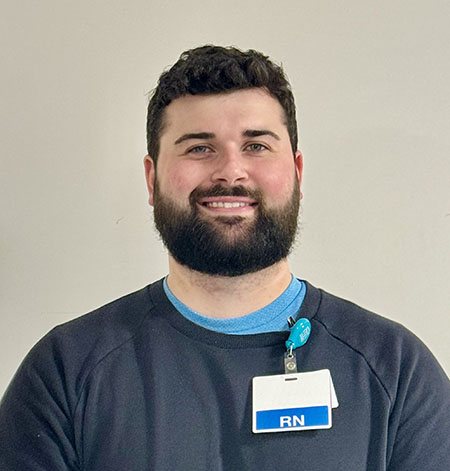Through our doors, exceptional nurses
provide exceptional care
Ryan McMahon, BSN, RN, originally studied Biochemistry and Molecular Biology at Dickinson College in Pennsylvania where he played football. Later, he earned a nursing degree from Curry College, graduating in 2021. He is currently enrolled in the PhD program at UMass Dartmouth and working full time in the Float Pool at Brigham and Women’s Faulkner Hospital. We asked Ryan to tell us about his life as a Float Pool nurse on the night shift.
My mom is a nurse and professor. She always wanted me to be a nurse, but I wasn’t sure. Around my junior year of college something clicked for me and I knew she was right. I love meeting people and having the opportunity to make a positive impact in their lives. As soon as I graduated with my first degree, I went right back to school to take the prerequisites I needed for nursing school. And I guess I love school so much that now I’m back working toward my master’s degree and PhD!

What made you choose nursing as a profession?
I was in nursing school during when the COVID-19 pandemic hit and everything changed—classes were online and clinical rotations were modified. Because of that, I felt as though I would be best served by entering a rigorous new grad program. In fact, that’s why I applied here at BWFH, I did some research and I really liked the Newly Licensed Nurse (NLN) Program that’s offered here. It is an extended orientation program that means you’re really well prepared to care for patients on your own when the time comes with great support along the way .
I was accepted to the NLN Program and I’ve been working in the Float Pool here at BWFH ever since.
You’ve worked your entire career in the Float Pool. What is that you like about the Float Pool?
You can work on basically any unit in the hospital and you never know where you will end up each day. Because of this, you learn so much about so many different types of nursing. With the additional rotations built in as part of my orientation, I have gained experience in several different areas. The nurses on the units know that the Float Pool nurses have a wide breadth of experience and I think often times they are really happy to have us join them on their units. A lot of times it turns out we have knowledge from working on a different unit that can be applied to their patients in that moment.
For some of Float Pool nurses, seeing the different types of nursing has helped them choose a specialty to pursue. But for a lot of us, we want to stay in the Float Pool simply because it’s always different. We’re a little bit nomadic, don’t really have a “home” within the hospital. But then again, in this position, the whole hospital becomes your home. We’re also lucky to have an amazing Nurse Director in Laurie Flahive who does an excellent job advocating for us.
What does your typical day look like?
I work the night shift, 7 p.m. to 7 a.m. If I worked the night before and am off for a few days I might try to stay up for a while when I first get home before going to sleep. During the day, I go to class, do some schoolwork and sleep before I leave for work in the evenings. Luckily, I can fall asleep anywhere, anytime but do try and get back on a “normal person” sleeping schedule on my days off. It’s also helpful that our Nurse Director is great about accommodating scheduling requests. She understands that I have a lot to balance with school and work and makes it easier for me to do both.
I usually arrive to work a little early, around 6:30 p.m. and go check in at the Staffing Office and get my assignment for the night. Sometimes I work the full 12 hours on one unit, and sometimes, depending on the needs within the hospital, I’m in one spot for four hours and the Nursing Supervisor will tell me I’m needed on a different unit for the next eight.
Working the night shift can be hard both psychically and mentally. What do you do to practice self-care?
As nurses, our work revolves around caring for others and many times, that can lead to us putting our own needs on the back burner. But honestly, I do the best I can. I’m still young and I feel like now is the time I can do it. I’d say the most important thing is to prioritize sleep, which is easier said than done as I’m getting through school and working full time. I actually just finished up my practicum hours for my master’s degree with Erica Babine, one of the professional development managers here at BWFH. I was doing that on my off days, so it has been extra busy. But I like to think of it as a form of resistance training. At some point, I will be done with school and I’ll be working days (maybe) and it will be so different compared to my current schedule.
Offering comprehensive medical, surgical and psychiatric care as well as complete emergency, ambulatory and diagnostic services to residents of southwest Boston and the surrounding suburbs.
Learn more about BWFH